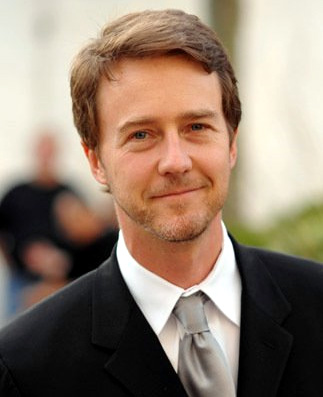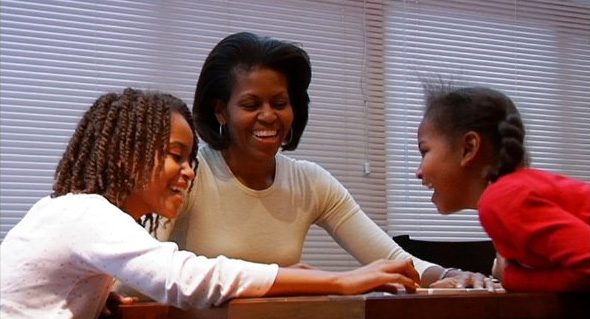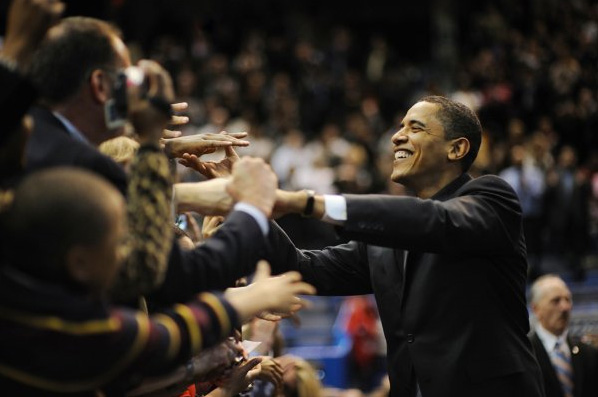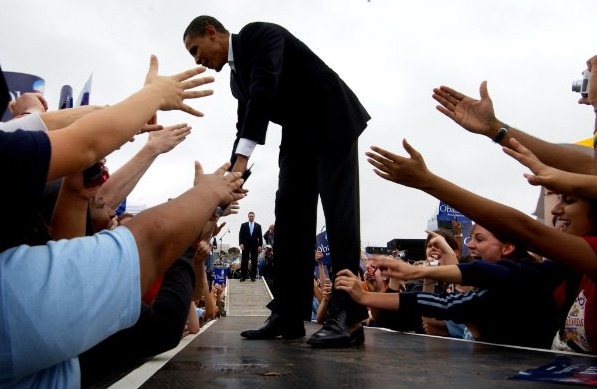CHICAGO – In anticipation of the scariest week of the year, HollywoodChicago.com launches its 2024 Movie Gifts series, which will suggest DVDs and collections for holiday giving.
Interview: Producer Edward Norton on Documentary ‘By the People: The Election of Barack Obama’
CHICAGO – HollywoodChicago.com recently interviewed Edward Norton on the new HBO documentary “By the People: The Election of Barack Obama” along with co-directors Amy Rice and Alicia Sams. Edward Norton served as a producer.
Question: What did this campaign and this candidate do to motivate kids (like 9-year-old Lorenzo Rivera) in such a way that they would hit the phones for Barack Obama in support?
 Edward Norton. Photo credit: Dimitrios Kambouris, WireImage.com |
Producer Edward Norton: It’s interesting because in some ways that’s what made us want to start this (project) in the first place. When Amy (Rice) first proposed it to us, it wasn’t a campaign film.
The idea was to chronicle this junior senator as he entered into the battle of government and politics. I think what drew us to him in the same way it drew everyone else was that he was so much younger.
Our generation – and even kids younger than us – are increasingly disengaged from politics. When Amy first put it to us, it was sort of like: “Don’t you think that for younger people it would be interesting to see what happens when that guy takes all this on?”
Part of our initial instinct about the whole thing was that (Obama) did speak to a young generation, (which) might make him an interesting prism through which to look at politics.
But I think when it became a campaign film, these (filmmakers) found a lot of people – not just young Lorenzo but (volunteers) Ronnie Cho and Mike Blake – who were very emblematic of a new generation investing itself in the Democratic process.
It’s actually what I like most about the film. I think the access to Obama is really cool as well as seeing some of the thinking of the senior staff as they go through it. But to me, Ronnie Cho and Mike Blake and those guys really represent the narrative of what actually made that campaign succeed, which is that they tapped that energy.
Question: How did you earn the trust and intimacy of these campaign operatives and particularly David Axelrod?
Director Amy Rice: Originally we gained access just from starting really early. I’ve spoken with other documentary filmmakers who tried to make documentaries about politicians and campaigns.
They said the key is that you really need to build trust with the campaign because in essence they don’t want cameras around behind the scenes. When (we) started filming, (our characters) were obviously aware of the camera. But after a while, they forget about it (especially with everything that was going on around them). They would forget about it and they trusted us.

U.S. President Barack Obama in the HBO documentary “By the People: The Election of Barack Obama”.
Image credit: HBO Documentary Films
Director Alicia Sams: With Axelrod, it was a combination of us wearing him down and Edward calling him.
When we finally interviewed him, Amy was wiring him and he sort of looked up and said: “How did I get here? I didn’t want to do this.” But at the end of the interview, he said it was actually really good to stop and reflect. I think then he saw the value of creating this historical record. We didn’t put anything on YouTube and eventually he did begin to trust us.
Edward Norton: I think a big part of it was separating (us) from the overnight media crowd. It was really (about) getting it clear in their minds that we wanted to create a record of the campaign that would not play in the election.
Question: Why release it now?
Alicia Sams: We talked with HBO about when to release it. We didn’t want to have it come out immediately. We wanted to (release it) now that it’s a year later. If you think about it, there really isn’t a good time for this movie to come out when he’s in office. With the … 24-hour news cycle, the news is (always) changing. We keep saying we’d like to fast forward 20 years from now and see how the film is perceived.

Michelle Obama (center) in the HBO documentary “By the People: The Election of Barack Obama”.
Image credit: HBO Documentary Films
Question: How were you able to capture the role racism played in the election?
Edward Norton: I think in some ways a big part of it was that Amy and Alicia got out there very early. Once (Obama) became a really viable candidate and when you could see people who were not for him start to tighten up a little bit, (it was) like they knew it was probably politically untenable to say certain things (in) certain ways.
The first time we ever talked about this movie (with producing partners Stuart Blumberg and William Migliore), we talked about this notion of having a Greek chorus in it where you balance the idea of him off of people in the public to see what the country is ready for and what it isn’t. What does his candidacy reveal about who we actually are, where we actually are and how far we’ve actually come?
I think one of the parts of the film I like the most is those cutaways to people reacting to him. I think the ones that were gotten early are very unvarnished. They’re not being racist per say, but they’re being honest about what they perceive America’s limitations to be. I think it’s great (that) you can see the tensions, prejudices and projections that people are still operating out of.

U.S. President Barack Obama (center) in the HBO documentary “By the People: The Election of Barack Obama”.
Image credit: HBO Documentary Films
Question: It would be interesting to speak to them now after he’s been elected into office.
Edward Norton: Yeah, I actually really like that idea. I think a funny follow up would be to interview each of those people again. But to your other question, I’m happy that one of the heads of HBO (Richard Plepler) made a decision not to rush to get this out in the spring even though in some ways it would’ve been easier when the shine was still on the whole thing.
There’s something more honest about putting it out later. I think the directors were very objective. It’s following the people in his campaign and (of course) they are very jubilant when he wins, but I think the film is pretty neutral. If we had put it out in the immediate wake of the election, it would’ve felt just like a celebration.
By putting it out now when he’s facing the complications of the presidency, it does more (of) what I think we intended it to do, which is open up questions and let people have a more complicated retrospective on that moment so they can weigh against where things are now. I think it’s more thought provoking to have it out now.

U.S. President Barack Obama (center) in the HBO documentary “By the People: The Election of Barack Obama”.
Image credit: HBO Documentary Films
Question: Since this film wasn’t originally designed to be a campaign film, how would it have looked differently if he hadn’t won?
Alicia Sams: We didn’t feel like we had a film until he won Iowa. Even if he didn’t win the election, we had a story. If he hadn’t won Iowa, we would’ve probably put it on the shelf and waited and gone back and continued to follow him and see where it went.
But once he won Iowa, that story of galvanizing and organizing those people was a pretty incredible story. Wherever it went after that would’ve been really interesting to follow. It probably (wouldn’t have been as) big or popular (of) a film (if Obama hadn’t won), but (still) an interesting film (nonetheless).
Question: Does Edward’s production company plan to make more documentaries?
Edward Norton: No. (Our involvement) wasn’t an agenda to make documentaries. My two partners and I were friends with Amy. We like to work on things with people we know. It evolved more out of all of us knowing each other and having a group interest in politics and things like that. But I don’t anticipate it leading to us becoming the next great engine of documentary films.
Question: How much footage do you have of the period before the actual election? Would you consider making a companion piece about Obama’s rise as a senator?
Amy Rice: We had 62 hours of footage before his announcement day. In documentary filmmaking, those hours are basically research and development hours. I don’t know if we have enough to make…
Alicia Sams: It would be the beginning of a story with no ending.
Amy Rice: But we ended up with 770 hours in the end. I have a feeling there might be another film in there, but I’m not sure if we’re ready to talk about it yet.

U.S. President Barack Obama (center) in the HBO documentary “By the People: The Election of Barack Obama”.
Image credit: HBO Documentary Films
Question: How did you go about choosing what footage you wanted to include in the finished film?
Alicia Sams: Well, once we figured out who our characters were – obviously Obama and Axelrod were our main characters – it was a matter of making sure they all had a narrative arc. They all had a beginning, middle and end to their stories that dovetails with (Obama’s) story.
A lot of great things – (such as) one of Amy’s favorite moments (where) Barack and Michelle joke around backstage – didn’t make the film because it didn’t serve the story. That’s just the nature of making a documentary film. You have to let a lot of really great things go to make two hours work as a narrative.
Amy Rice: We also had an incredible editing team (Sam Pollard, Geeta Gandbhir and Arielle Amsalem). The big challenge was that everybody knew the ending of our story.
We had to really pick and choose which moments to include in the story that played out in the national media (and) that people wanted in the movie to situate them in time. We combined that with the Ronnie Cho stories that people didn’t know and (struck) a balance with that. That was very challenging. There were many sleepless nights during the edit.
 | By ADAM FENDELMAN |


